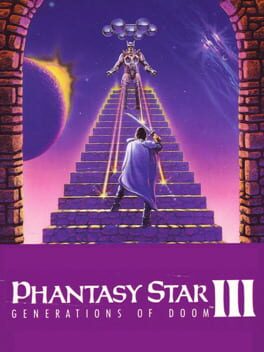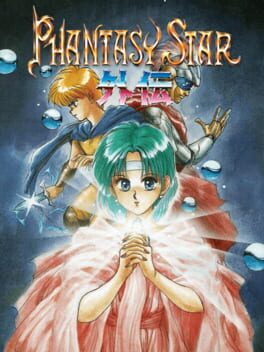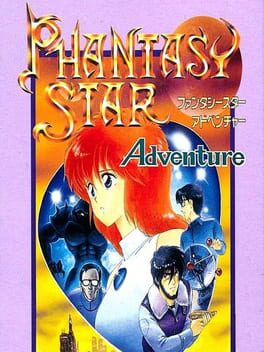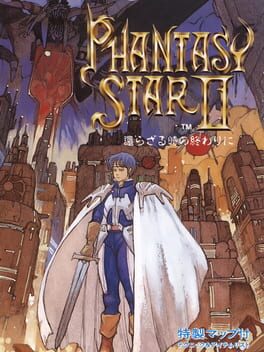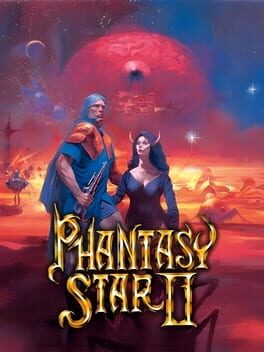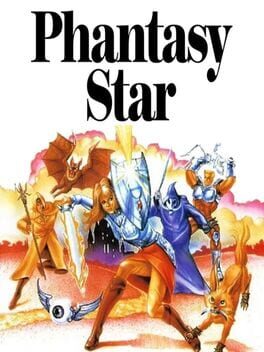

Just as you’re about to marry Maia, the mysterious woman you found on the shore, a winged dragon grabs her and disappears. This is the tragic start of what seems like a never-ending journey into a world of loathsome creatures and wicked souls that spans three generations.
Also in series
Reviews View More
I once imagined buying "Sonic's Ultimate Genesis Collection" in 2009 that this Phantasy Star was the only one I was interested in playing. On paper, it sounds the most interesting of the bunch; a branching narrative of generational struggle, 6 years before Fire Emblem would try the same thing in Genealogy of the Holy War. I never got very far, completing most of the first generation in a few drunk nights after my grocery store shift. Still, I think the promise of getting to Phantasy Star III was part of the reason I picked up the Sega Ages release of Phantasy Star.
I loved PS and so, I decided to play through the series. As I get older, my tolerance for grindiness has gone up, and being able to play games like this and Final Fantasy 8 with a speed-up feature makes it a breeze. Pop on some TV! Crack a brew! Phantasy Star was a revelation. It truly felt that if I had access to it (especially with the FM soundtrack) I would have been into totally different shit growing up. Phantasy Star II was good! A step down from the first, perhaps, but sweeping in a way that still feels ahead of its time.
In comparison, Phantasy Star III feels...cheap. The promise of a story told over generations quickly dries up, as it seems the main benefit of this was for the dev team to increase the length of the game without making too many locations or music. And even if there are more characters than Phantasy Star II, I feel like there's maybe 1/3 of the text and dialogue?
It's not all bad. The combat is snappier, and there is at least one standout character in Lyle, the buddy/uncle who can turn into a dragon. He owns. Play the game until he dies then turn it off, that's my review.
I added half a star because the 2 second loop that plays at the start of random battles is hard as hell.
I loved PS and so, I decided to play through the series. As I get older, my tolerance for grindiness has gone up, and being able to play games like this and Final Fantasy 8 with a speed-up feature makes it a breeze. Pop on some TV! Crack a brew! Phantasy Star was a revelation. It truly felt that if I had access to it (especially with the FM soundtrack) I would have been into totally different shit growing up. Phantasy Star II was good! A step down from the first, perhaps, but sweeping in a way that still feels ahead of its time.
In comparison, Phantasy Star III feels...cheap. The promise of a story told over generations quickly dries up, as it seems the main benefit of this was for the dev team to increase the length of the game without making too many locations or music. And even if there are more characters than Phantasy Star II, I feel like there's maybe 1/3 of the text and dialogue?
It's not all bad. The combat is snappier, and there is at least one standout character in Lyle, the buddy/uncle who can turn into a dragon. He owns. Play the game until he dies then turn it off, that's my review.
I added half a star because the 2 second loop that plays at the start of random battles is hard as hell.
Full Review: https://youtu.be/GAK1LgMVvDY
TL;DW
Ambitious multi generational RPG, falls apart in the final chapter due to repetition, gameplay is a step forward from the previous iteration, but everything else is a step back.
TL;DW
Ambitious multi generational RPG, falls apart in the final chapter due to repetition, gameplay is a step forward from the previous iteration, but everything else is a step back.
Just how rushed was Phantasy Star 3's dev cycle? Well, at one point in the game an old sage gives you directions towards the next destination in your quest, but he gives you the wrong directions due to an error in the script. The devs could have gone into the game's code to fix the dialogue... but that would take too much time, so they simply added a paragraph to the instruction manual saying "one of the sages on Sage's Isle seems to have gone a bit senile! He says this thing but actually means that other thing.
Few games make me as sad as Phantasy Star 3 does; its blend of sheer potential and shoddy execution oozes out of every pore. On the one hand, it's impossible to exaggerate just how comically slow your walk cycle is, and - combined with the random encounter rate - how unplayable this game is on original hardware. The second town is just over two screens away from the first, and I dropped the game before even reaching it because young Prince Rhys walked like a zombie with testicular torsion. On the other hand, with the aid of fast-forward, this most recent playthrough means that I've actually completed all four available story paths! PS3 has one of my favorite plot reveals in all of gaming and one of my favorite settings as well; while the skimpy script barely does it justice, it did just enough to keep me soldiering on through the tedious grind.
Even the game's music is full of poorly-executed great ideas (at least the few tracks that I heard without fast-forward). There are some very decent tracks here like the opening theme and wedding theme that are just clumsily orchestrated, with the abundance of bells turning otherwise pleasant sections into a huge racket. There's the battle music which has three variations depending on whether you're winning or losing - which is a fantastic idea, but the three themes are very different and just kinda mash into each other with no transition, making it feel extremely jarring. The world map theme is one of the few standout tracks that doesn't do anything egregious, adding a new instrument for each character that joins your party and gradually metamorphosing from hopeful-and-slightly-bland to triumphant march.
Some people say that it's always better to remake a flawed game than a good one, and I always bring this game up as the one I most want to see remade. Its rushed dev cycle and hardware limitations turned what could have been an all-time classic into... well, this. It's an absolute mess and spends so much of its playtime being tedious and unengaging, and I'm probably in the minority by being charmed by the shadow of what this game is trying to be.
I'd actually recommend everyone give this a spin, but that would no doubt result in me receiving a few death threats, so go read an LP or something.
Few games make me as sad as Phantasy Star 3 does; its blend of sheer potential and shoddy execution oozes out of every pore. On the one hand, it's impossible to exaggerate just how comically slow your walk cycle is, and - combined with the random encounter rate - how unplayable this game is on original hardware. The second town is just over two screens away from the first, and I dropped the game before even reaching it because young Prince Rhys walked like a zombie with testicular torsion. On the other hand, with the aid of fast-forward, this most recent playthrough means that I've actually completed all four available story paths! PS3 has one of my favorite plot reveals in all of gaming and one of my favorite settings as well; while the skimpy script barely does it justice, it did just enough to keep me soldiering on through the tedious grind.
Even the game's music is full of poorly-executed great ideas (at least the few tracks that I heard without fast-forward). There are some very decent tracks here like the opening theme and wedding theme that are just clumsily orchestrated, with the abundance of bells turning otherwise pleasant sections into a huge racket. There's the battle music which has three variations depending on whether you're winning or losing - which is a fantastic idea, but the three themes are very different and just kinda mash into each other with no transition, making it feel extremely jarring. The world map theme is one of the few standout tracks that doesn't do anything egregious, adding a new instrument for each character that joins your party and gradually metamorphosing from hopeful-and-slightly-bland to triumphant march.
Some people say that it's always better to remake a flawed game than a good one, and I always bring this game up as the one I most want to see remade. Its rushed dev cycle and hardware limitations turned what could have been an all-time classic into... well, this. It's an absolute mess and spends so much of its playtime being tedious and unengaging, and I'm probably in the minority by being charmed by the shadow of what this game is trying to be.
I'd actually recommend everyone give this a spin, but that would no doubt result in me receiving a few death threats, so go read an LP or something.
Game Review - originally written by Kitsune Sniper (aka Foxhack)
I just couldn’t get into this game. I know Phantasy Star is one of the best RPG series around, but I just couldn’t get into it.
You play a character named Rhys, and you go around doing missions in a typical RPG fashion. Still with me? Well, you’re going to marry someone. A girl. And she gets kidnapped. So your father sends you to jail.
Still with me?
Soooo, after escaping, and a long time afterwards, you get to marry someone, and depending on who you choose, you’ll get different children, and different storylines. Sounds neat? It is neat! It was something original during its time, and to my knowledge, no one else has tried it again.
Too bad I found the game boring. Maybe one day I’ll get into it.
I just couldn’t get into this game. I know Phantasy Star is one of the best RPG series around, but I just couldn’t get into it.
You play a character named Rhys, and you go around doing missions in a typical RPG fashion. Still with me? Well, you’re going to marry someone. A girl. And she gets kidnapped. So your father sends you to jail.
Still with me?
Soooo, after escaping, and a long time afterwards, you get to marry someone, and depending on who you choose, you’ll get different children, and different storylines. Sounds neat? It is neat! It was something original during its time, and to my knowledge, no one else has tried it again.
Too bad I found the game boring. Maybe one day I’ll get into it.
I understand completely why Phantasy Star III has its reputation as the black sheep of the Phantasy Star series. To reduce it down to that, however, would do a disservice to a truly wonderful game.
The main draw of the game, as its subtitle Generations of Doom would imply, is that it is the story of not only one hero, but also of his children and his children's children. At the end of Rhys' story, he has the choice to marry one of two women; the game then follows on with his son (Ayn or Nial). At the conclusion of their own quest, the same choice can be made, leading to four possible choices for the third generation.
It's a very ambitious concept — each successive generation doubles the number of stories that can be told. As a result, each generation has a fairly short story. It's no wonder that the third generation gets the short end of the stick, given that it had to be four distinct stories leading to similar conclusions. The end result is that, while the second generation drastically differs between the two possible protagonists, the third generation basically consists of "get the crew together, get the legendary weapons, beat the bad guy". The first time through the third generation is an honestly great story (unless you pick Aron). The next three times? Less so. They only really differ in terms of the introductory cutscene and the final cutscene. The most frustrating thing is that the intro and ending cutscenes for the third generation are all wonderfully evocative and deserve to be fully explored. Alas, due to technical and time limitations it was not to be.
That said, what is there is great. Things are seeded in the first generation that won't come to fruition until the third. Some worlds that go unvisited in one story are central to others. Depending on who Rhys marries, the third-generation character Kara will be either a sheltered princess or a hardened warrior. As ageless androids, Wren and Mieu are constants, participating in all three generations. The villain of Nial's story only appears once in the stories of Ayn's children, and the villain of Ayn's story only appears once in the stories of Nial's children: it is clear in both cases that their stories played out in some capacity even if we didn't see them onscreen. There are many games that feel like setting sourcebooks more than they do narratives, and I feel like Phantasy Star III is somewhere in the middle. The narrative had to step back to make way for the generational concept, and the generational concept served to more deeply explore the setting.
Phantasy Star III, like its predecessor, was developed in six months with very few internal resources devoted to it. Notably, the team that worked on it was not the team that worked on the other titles, including the later Phantasy Star IV: End of the Millenium. This is immediately apparent from the visual style, which seems to be allergic to outlines. The style is jarring coming from Phantasy Star II, but you quickly get used to it. I find it gels nicely with the game's tone: it lends it a more painterly quality, to go with the more melancholy music.
Gone are the chipper ditties of Phantasy Star II. Phantasy Star III's soundtrack is much more down to earth, fitting for a game about a multi-generational struggle to finally end a centuries-long war. It's contemplative. Of particular note is the overworld theme, which is dynamic in a way I have never seen anywhere else. At the beginning of the game, when it's just Rhys venturing on his lonesome, there is only the melody and bassline playing. When a party member is recruited, a harmony is added; the next brings an ostinato; the fourth a countermelody; the fifth a snare drum with a marching beat. As more people join your cause, the music slowly transforms from lonely and melancholic to hopeful and almost triumphant. Listening to all of the variations back-to-back is a magical experience I wish I could experience for the first time again. I was surprised when playing to see that the overworld even has a variant for when the main character is dead! Supposedly, the game was to have each individual character affect the overworld theme in different ways. I can see how that was infeasible, but I would love to see what that could have been.
The overworld theme is not the only standout in the soundtrack, although it is by far my favorite piece. The prelude, Laya's World, Lashute, and Dark Force are all outstanding tracks. Similar to the overworld theme, the battle theme will change depending on how you're faring in the fight: there are three songs that can play depending on whether you're winning, losing, or on even ground. The song for when you're winning is particularly upbeat: a friend noted that it's kind of similar to the Chao Race theme from Sonic Adventure 2's Chao Garden. One of my few real issues with the game is how going into a battle will reset the map music to the beginning — you will get very used to hearing the first several bars of many songs.
Phantasy Star III's gameplay feels like an iteration on that of its predecessor, Phantasy Star II. Combat now has the option to automate a single turn instead of just running completely on autopilot. You can finally target individual enemies. You now have a maximum of five party members instead of four. The magic system is one I haven't seen in other games: instead of gaining new spells as you level up, party members know all of their spells from the get-go. Spells are categorized into groups of four spells, and you can choose to prioritize certain spells over others. It's an intriguing system that is only hampered by the fact that the game is in no way difficult. There is little reason to use any spell that isn't Gires. The only time when the game is really challenging is at the very beginning, when you have no party members and no health, and at the very end of the game, when the game remembers that it can have enemies hit hard. Using a spell in and of itself needs to compete with the base desire to just spam the auto-battle button, which defaults to melee attacks.
Walking into Phantasy Star III, I expected a mess of a game, an idea without execution. What I got is a game I am surprised to say that I love. It's not a perfect game by any means, but it's a perfectly serviceable sequel. It follows up on the consequences of Phantasy Star II in a more indirect way than series fans might like, but fortunately Phantasy Star IV exists to fill that gap.
The main draw of the game, as its subtitle Generations of Doom would imply, is that it is the story of not only one hero, but also of his children and his children's children. At the end of Rhys' story, he has the choice to marry one of two women; the game then follows on with his son (Ayn or Nial). At the conclusion of their own quest, the same choice can be made, leading to four possible choices for the third generation.
It's a very ambitious concept — each successive generation doubles the number of stories that can be told. As a result, each generation has a fairly short story. It's no wonder that the third generation gets the short end of the stick, given that it had to be four distinct stories leading to similar conclusions. The end result is that, while the second generation drastically differs between the two possible protagonists, the third generation basically consists of "get the crew together, get the legendary weapons, beat the bad guy". The first time through the third generation is an honestly great story (unless you pick Aron). The next three times? Less so. They only really differ in terms of the introductory cutscene and the final cutscene. The most frustrating thing is that the intro and ending cutscenes for the third generation are all wonderfully evocative and deserve to be fully explored. Alas, due to technical and time limitations it was not to be.
That said, what is there is great. Things are seeded in the first generation that won't come to fruition until the third. Some worlds that go unvisited in one story are central to others. Depending on who Rhys marries, the third-generation character Kara will be either a sheltered princess or a hardened warrior. As ageless androids, Wren and Mieu are constants, participating in all three generations. The villain of Nial's story only appears once in the stories of Ayn's children, and the villain of Ayn's story only appears once in the stories of Nial's children: it is clear in both cases that their stories played out in some capacity even if we didn't see them onscreen. There are many games that feel like setting sourcebooks more than they do narratives, and I feel like Phantasy Star III is somewhere in the middle. The narrative had to step back to make way for the generational concept, and the generational concept served to more deeply explore the setting.
Phantasy Star III, like its predecessor, was developed in six months with very few internal resources devoted to it. Notably, the team that worked on it was not the team that worked on the other titles, including the later Phantasy Star IV: End of the Millenium. This is immediately apparent from the visual style, which seems to be allergic to outlines. The style is jarring coming from Phantasy Star II, but you quickly get used to it. I find it gels nicely with the game's tone: it lends it a more painterly quality, to go with the more melancholy music.
Gone are the chipper ditties of Phantasy Star II. Phantasy Star III's soundtrack is much more down to earth, fitting for a game about a multi-generational struggle to finally end a centuries-long war. It's contemplative. Of particular note is the overworld theme, which is dynamic in a way I have never seen anywhere else. At the beginning of the game, when it's just Rhys venturing on his lonesome, there is only the melody and bassline playing. When a party member is recruited, a harmony is added; the next brings an ostinato; the fourth a countermelody; the fifth a snare drum with a marching beat. As more people join your cause, the music slowly transforms from lonely and melancholic to hopeful and almost triumphant. Listening to all of the variations back-to-back is a magical experience I wish I could experience for the first time again. I was surprised when playing to see that the overworld even has a variant for when the main character is dead! Supposedly, the game was to have each individual character affect the overworld theme in different ways. I can see how that was infeasible, but I would love to see what that could have been.
The overworld theme is not the only standout in the soundtrack, although it is by far my favorite piece. The prelude, Laya's World, Lashute, and Dark Force are all outstanding tracks. Similar to the overworld theme, the battle theme will change depending on how you're faring in the fight: there are three songs that can play depending on whether you're winning, losing, or on even ground. The song for when you're winning is particularly upbeat: a friend noted that it's kind of similar to the Chao Race theme from Sonic Adventure 2's Chao Garden. One of my few real issues with the game is how going into a battle will reset the map music to the beginning — you will get very used to hearing the first several bars of many songs.
Phantasy Star III's gameplay feels like an iteration on that of its predecessor, Phantasy Star II. Combat now has the option to automate a single turn instead of just running completely on autopilot. You can finally target individual enemies. You now have a maximum of five party members instead of four. The magic system is one I haven't seen in other games: instead of gaining new spells as you level up, party members know all of their spells from the get-go. Spells are categorized into groups of four spells, and you can choose to prioritize certain spells over others. It's an intriguing system that is only hampered by the fact that the game is in no way difficult. There is little reason to use any spell that isn't Gires. The only time when the game is really challenging is at the very beginning, when you have no party members and no health, and at the very end of the game, when the game remembers that it can have enemies hit hard. Using a spell in and of itself needs to compete with the base desire to just spam the auto-battle button, which defaults to melee attacks.
Walking into Phantasy Star III, I expected a mess of a game, an idea without execution. What I got is a game I am surprised to say that I love. It's not a perfect game by any means, but it's a perfectly serviceable sequel. It follows up on the consequences of Phantasy Star II in a more indirect way than series fans might like, but fortunately Phantasy Star IV exists to fill that gap.
This could've been a pretty cool old-school jrpg :((( the generation system is a nice system on paper, but the world is very boring and lifeless. Why all cities were the same just with a few buildings swapped around? And don't let me remember the backtracking, which is criminal in this game. You don't unlock fast travel till VERY late in the game, and you gotta walk to go some places anyway. What a wasted opportunity.
